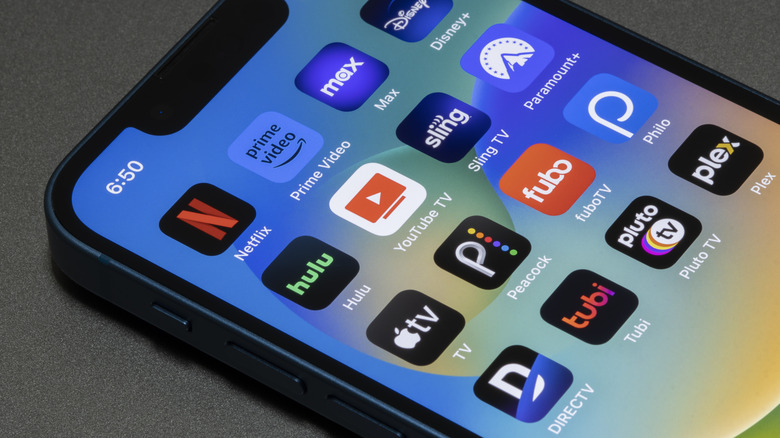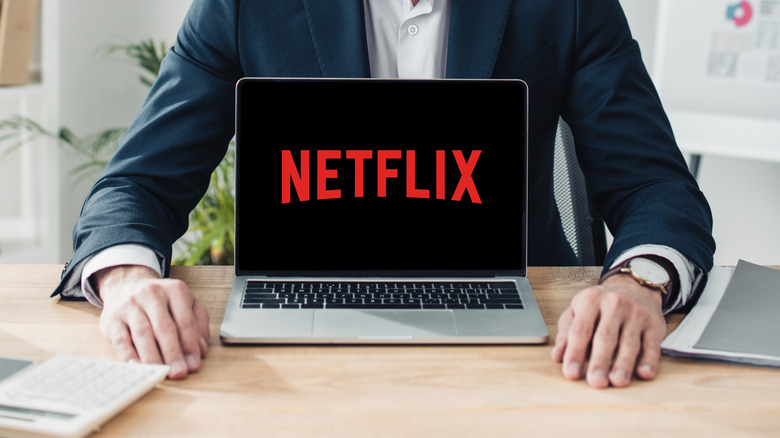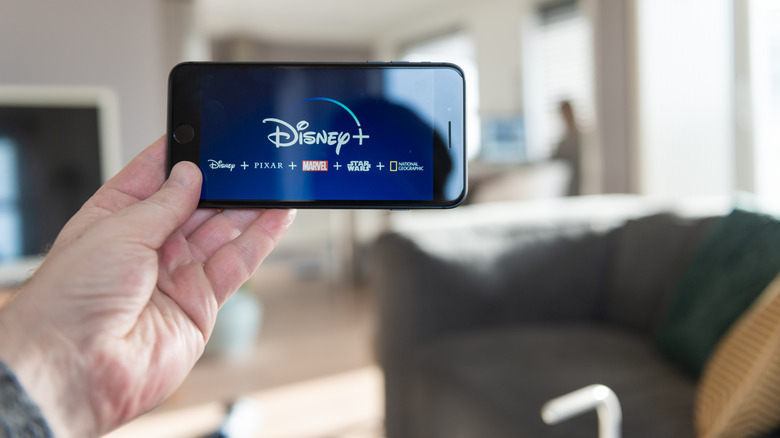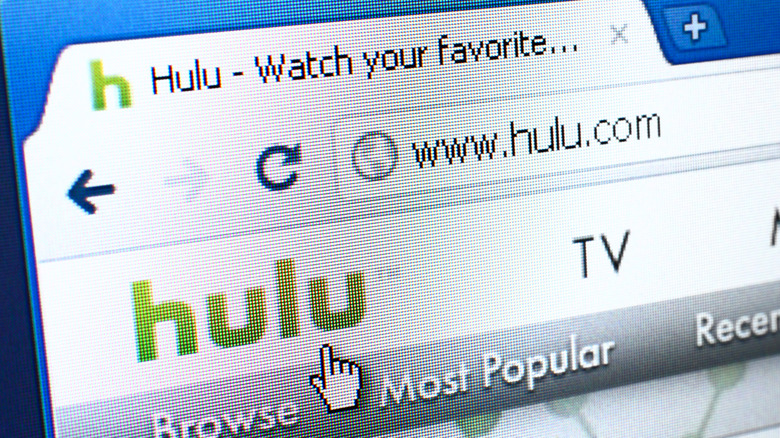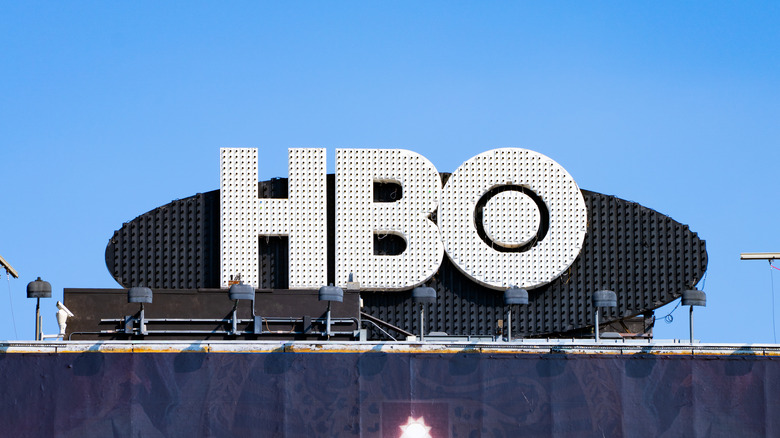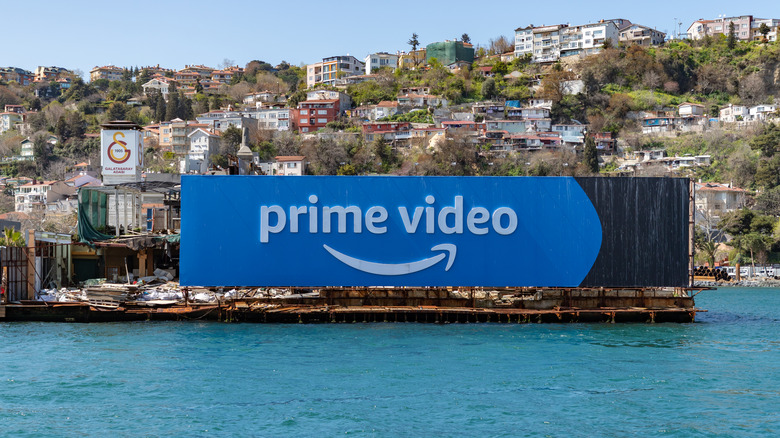Don't Share Your Passwords For These Streaming Platforms In 2024
Password sharing: That little practice of users sharing their login credentials with friends and family members for a website or app. While this term could apply to any number of websites, it most commonly refers to people sharing access to streaming platforms like Netflix. Put simply, it's a way for users to avoid paying full price for their own account, allowing them to binge "Stranger Things" or "Queen's Gambit" free of charge. With streaming getting more expensive, users cut every corner they can. Unfortunately, the whole practice is gradually going the way of the Dodo.
What changed? Password sharing has always cut into a streaming service's profits, and now they've decided to do something about it. As long as there are no restrictions on the practice, streaming platforms miss out on a large chunk of the market. While only a few platforms are cracking down on password sharing presently, analysts predict more will join the fold in due time. It might be a hard pill for users to swallow, but companies have introduced a couple of benefits to ease the pain.
In particular, some of the streaming services have started adding lower-cost tiers, including ad-supported options, which are becoming increasingly popular. So, which platforms are cracking down on sharing passwords? Netflix led the charge and was promptly followed by Disney+. Hulu is also joining the crackdown along with Warner Bros. Discovery's Max.
Netflix
Netflix used to be the streaming platform that encouraged password sharing, famously posting, "Love is sharing a password" on social media. However, the company eventually saw its number of subscribers plateau, forcing it to make some changes. The answer to its problem was getting every potential subscriber to sign up with their own account. In May 2023, the streaming giant started cracking down on password sharing, effectively putting an end to the practice.
Co-CEO of Netflix, Ted Sarandos, knew cracking down on this was going to be controversial and infuriate some users, saying, "Consumers aren't going to love it right out of the gate, but we need to show them why they should see value" during a Wall Street conference. Despite this, the streaming platform boasted 9 million additional subscribers five months following the crackdown. Then, in 2023's fourth quarter, Netflix added an additional 13.1 million subscribers, bringing its total number of active subscribers to 260 million. Introducing a more affordable ad-supported subscription helped, executives said.
Netflix offers several tiers, with the ad-based subscription being its cheapest option. As of March 2024, Netflix offers U.S. customers a "Standard with ads" tier for $6.99 a month, "Standard" without ads for $15.49 a month, and "Premium" for $22.99. Standard (without ads) and premium subscribers have the option to add additional users for an extra $7.99 per month, and each additional user gets their own login credentials. Netflix monitors password sharing by analyzing IP addresses, device IDs, and account activity.
Disney+
Disney+ reported a drop of roughly 12 million subscribers, or about 7% of its total subscriber base, in August 2023, bringing its total subscriber count from 157 million in 2023's second quarter to 146 million in the third quarter. This drop signaled necessary changes for the streaming giant. Bob Iger, Disney's CEO, said, took a page from Netflix's playbook, saying, "We are actively exploring ways to address account sharing and the best options for paying subscribers to share their accounts with friends and family," in an earnings call (via Variety) in August 2023.
Disney's streaming service started restricting shared passwords in waves, with its first wave hitting Canadian users back in November 2023. It announced a full ban on the practice in February 2024 and told existing subscribers they have until March 14, 2024 to settle their accounts. Disney+'s current number of subscribers sits at more than 149 million, but executives are hopeful that cracking down on password sharing will have the same effect it did for Netflix.
Disney+ subscribers in the U.S. can choose either the Basic plan, which comes with ads, for $7.99 per month, or the Premium, no-ad plan, for $13.99 per month. It also offers a variety of bundles that give subscribers access to different Disney-owned platforms, such as Hulu and ESPN.
Hulu
While Disney+ subscribers were receiving notices about its crackdown on shared passwords, Hulu users were receiving the same notice due to Disney owning both streaming platforms. Before Disney moved to end password sharing on its platforms, Hulu's FAQ made it clear that each account was meant for a single household. It just didn't strictly enforce it.
That's all changing now. In January 2024, Hulu revised its terms of service, requiring all new users outside of a household to have their own account. However, existing users have the same deadline of March 14, 2024, as Disney+ users to sort it all out. While Hulu's new subscriber agreement states it will "analyze the use of your account to determine compliance," the streaming platform isn't clear on its methods for monitoring compliance.
Hulu offers two tiers for subscribers. Like Disney+, its ad-supported plan is only $7.99 per month. Its ad-free tier, on the other hand, is pricier than Disney+'s, coming in at $17.99 per month. However, subscribers can attempt to save a penny or two by signing up for one of the brand's many bundles that include Disney+, ESPN, live TV, or a combination thereof.
Max
"The Last of Us" fans should prepare to sign up for their own account with Warner Bros. Discovery's streaming platform, Max. Even when it was known as HBO Max, it encouraged subscribers to restrict account access to those in their homes. However, the company didn't seem to enforce its policy too broadly. Naturally, users took advantage and shared their accounts. Unfortunately, for those without an account of their own, a crackdown on Max is imminent.
JB Perrette, WBD's Head of global streaming and games, announced the launch of an initiative to limit password sharing for later this year that would carry into 2025. If Netflix is any indicator, there's little doubt that this move will lead to an increased number of subscribers, which will help recoup a fraction of the $2 billion the streaming service lost in 2022.
As of the end of 2023, over 97 million users were subscribed to Max. While it is nowhere near as popular as Netflix or even Disney+, it is home to some of the top-rated movies and shows available right now, such as "Dune: Part One," "True Detective," and "House of the Dragon."
Apple TV Plus
Apple TV+ is a unique streaming service with its rules on password sharing. While it doesn't have any rules against sharing passwords with others, it does limit the number of people who can use the same account, which it has been doing since day one. This can be seen as a form of password-sharing restriction.
Through its Family Sharing feature, Apple TV+ users can have up to six people, including the original subscription holder, on one account. While Apple repeatedly uses the word "family" in its language, it doesn't define what family is. If a user wants to include their friend in another state in their "family," they seem free to do so. However, anyone included in the Apple Family has to live within the same country as the original subscriber.
It's unknown exactly how many subscribers Apple TV+ has because the company doesn't share its metrics on that, but some estimates put the number around 25 million, which is significantly lower than Netflix's 260 million and even Max's 97 million.
Those that aren't cracking down on password sharing
Despite all the crackdowns, there are a few streaming services that don't appear to be putting a limit on password sharing just yet.
Amazon's Prime Video hasn't declared an initiative to restrict users from sharing passwords. Since Prime Video isn't Amazon's primary business, it's unlikely to follow Netflix and the others, though it did recently introduce ads. In fact, in a post on X (formerly Twitter) from May 2023, Prime Video trolled Netflix for its restriction on password sharing. Prime Video even has a way for users to grant others access to their accounts without sharing their login credentials.
Meanwhile, NBCUniversal, which owns Peacock, has guidelines in its TOS that restricts account usage to those in the same household, but it doesn't seem to strictly enforce it. A representative for the company has stated that there are no plans to change policies.
Paramount Plus also recommends sharing passwords only with family members, but it doesn't appear to put up any barriers if subscribers choose to let those outside their home use their account.
